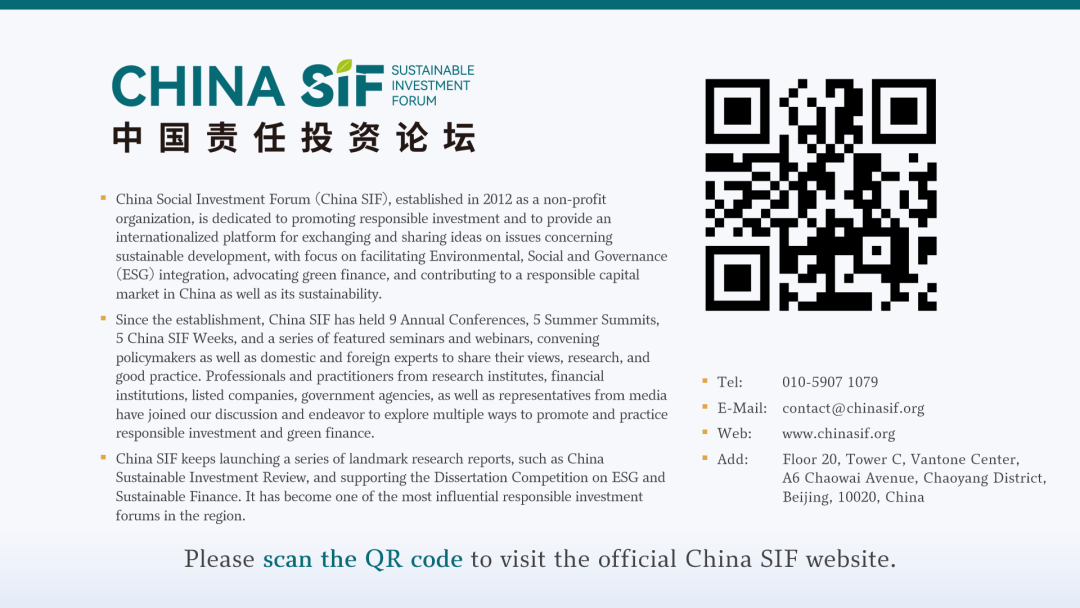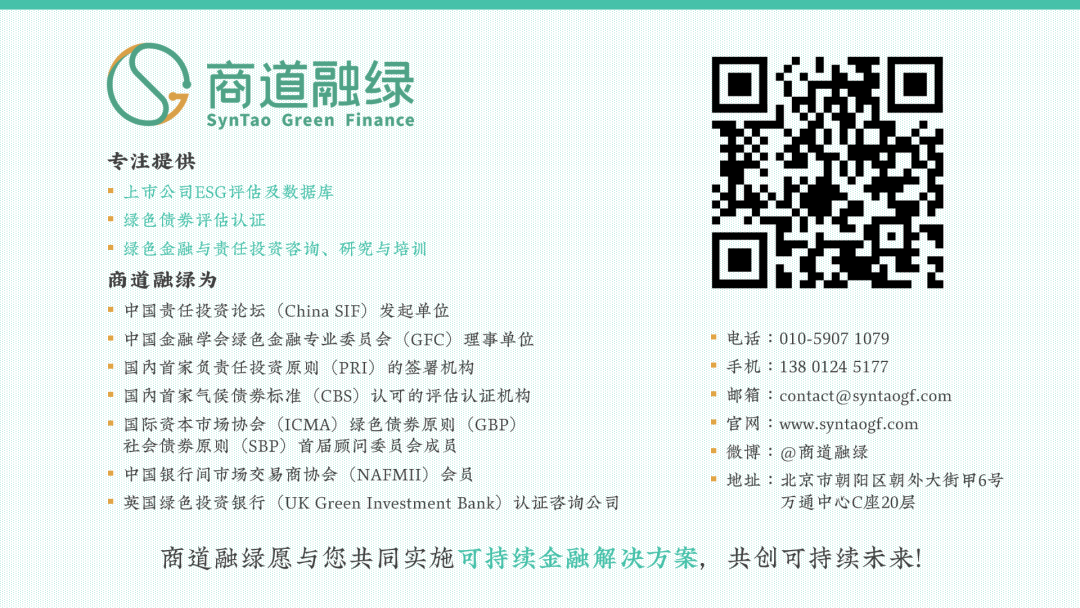On July 12, the China Sustainable Investment Forum (China SIF) Summer Summit 2022, organized by SynTao Green Finance and co-hosted by the Asia Investor Group on Climate Change (AIGCC), was successfully held. The Summit received strong support from strategic partners Moody's and AXA SPDB Investment Fund. With the theme of "Building a Transition Finance System", the speakers at the Summit discussed the opportunities and challenges of developing transition finance in China in terms of policy drives, incentive mechanisms, product innovation and financial instruments.
The panel discussion focused on "High-Quality Transition" and was moderated by Mr. YU Jiantuo, Deputy Secretary General of China Development Research Foundation. Ms. LIU Xiaowei, Director of Special Projects Asia at the World Energy Council, Mr. Jeffrey Sukjoon LEE, Vice President and APAC Manager at the Sustainable Finance Division, Moody's ESG Solutions, Mr. ZHU Ling, Country Lead of Capital Markets, CDP China, and the Head of Credit Policy Division (Industry Research Division), Credit Management, and Green Finance Division of China Postal Savings Bank (PSBC) Dr. ZHANG Mingzhe, had an in-depth discussion on the challenges of sustainable finance in the context of high-quality transition, their causes, and potential solutions.
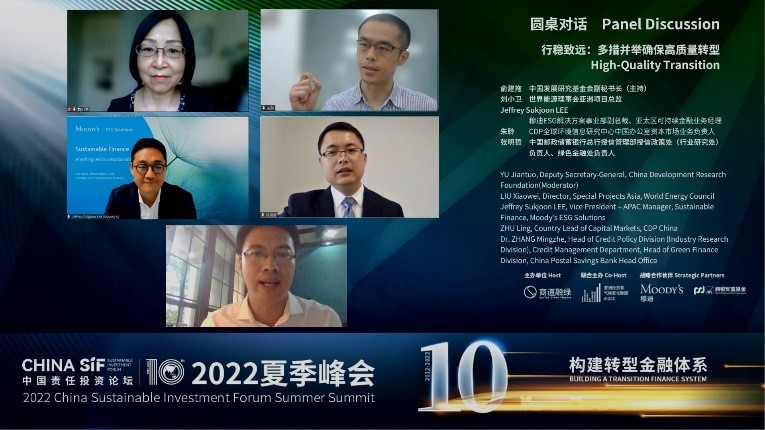 Enhancing Standard Setting and Information Disclosure to Empower Companies to Develop Credible Transition Plans
Enhancing Standard Setting and Information Disclosure to Empower Companies to Develop Credible Transition Plans
Mr. Yu Jiantuo, the moderator of the panel discussion, first introduced the theme and background of the panel discussion. He pointed out that sustainable development is a multi-level and multi-step project. From the demand side, it involves the needs of the world, countries, regions, communities, and individuals at multiple levels, as well as needs generated from different sectors such as government, enterprises, and society. On the supply side, it is a complex ecology composed of series of work such as information disclosure, analysis, rating, financial product development and application, etc. Therefore, to promote the high-quality transition of sustainable development, we need to grasp the key areas for improvement and develop a deep understanding.
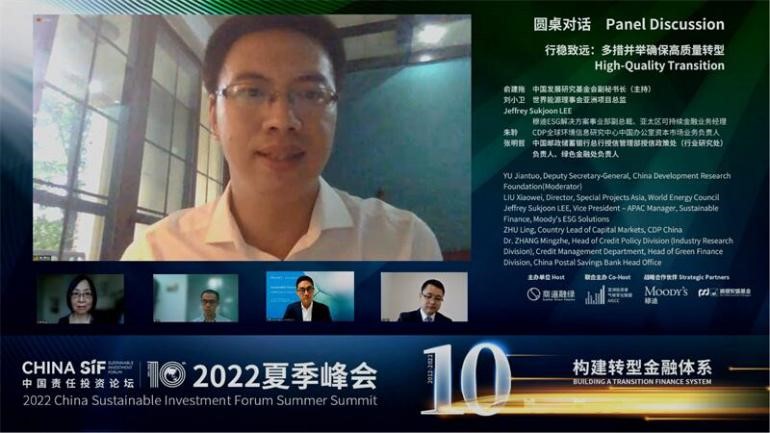
Mr. Jeffery Sukjoon LEE, noted that "transition finance is essential to drive sustainable development in APAC. Issuers from hard-to-abate sectors need credible transition plans, strategies, and metrics if they wish to fully leverage and access sustainable finance markets. While we've seen improvements in corporate disclosures around greenhouse gas emissions, much needs to be done in terms of standardization and coverage."

According to Ms. LIU Xiaowei, the world needs balanced solutions for high-quality transitions at multiple fronts, and we are working to deliver the vision of humanizing energy, putting people and the planet at the centre of all solutions.
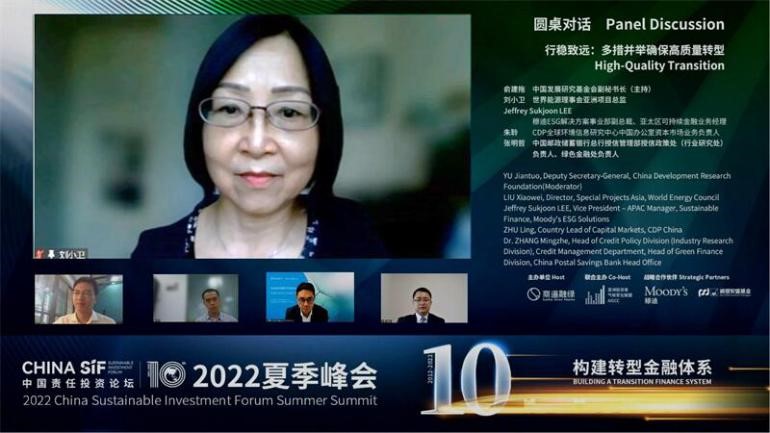
Mr. ZHU Ling, pointed out that the promotion of corporate environmental information disclosure is a key component of transition finance for the real economy. CDP will strengthen the information foundation of transition finance by contributing to broader and higher quality disclosure in the market.
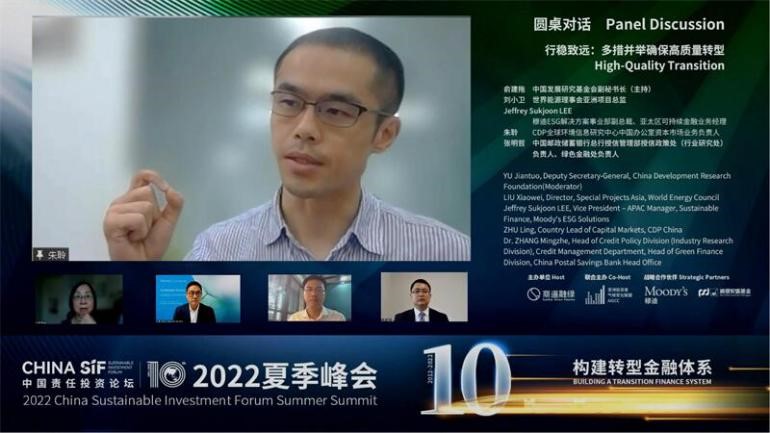
Dr. ZHANG Mingzhe, highlighted five challenges, including theoretical research, top-level design, product innovation, environmental risk management capability and data access enhancement, and finally, information disclosure.
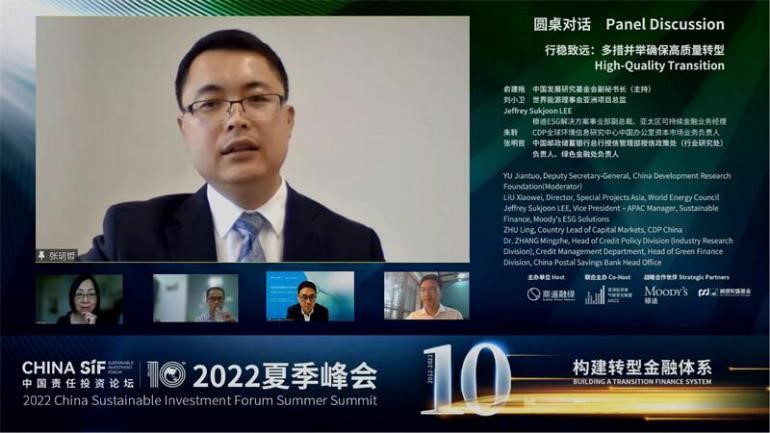 Enhancing ESG Data Measurement and Service Capability to Help Society Form a Consensus
Enhancing ESG Data Measurement and Service Capability to Help Society Form a Consensus
Behind the challenges affecting sustainable finance to facilitate high-quality transition lie a number of underlying causes. Understanding these causes is a prerequisite for designing solutions and taking measures to guide high-quality transition. Against this backdrop, the speakers provided their lnsights.
Ms. LIU Xiaowei believes that a basic understanding of energy can help society form a consensus, and to this end, the World Energy Council will carry out activities to popularize energy knowledge and strive to help billions of people to learn the basics of energy.
Mr. Jeffrey Sukjoon LEE believes that Scope 3 carbon emission measurement is a difficult point for carbon accounting and carbon information disclosure; meanwhile, guidance and guidelines related to climate transition need to be developed to increase companies’ motivation to develop credible transition plans.
Mr. ZHU Ling pointed out that ESG investment concept in China is still young. Quantitative ESG data collection and collation just started, relatively short of historical data support. CDP, as a data collection platform, will actively promote all parties to improve their internal capacity.
Dr. ZHANG Mingzhe pointed out that multiple factors have influenced the deep integration of sustainable finance and low carbon transition. He believes that in order to promote the deep involvement of sustainable finance in the low-carbon transition, it is necessary to increase research efforts, raise the level of awareness, gradually improve policies and enhance the service capacity of financial institutions.
All Solutions are Designed to Put People and the Environment at the Center, to Facilitate Just Transition
Finally, the panelists all made policy recommendations on solutions for facilitating high-quality transition based on their respective practical experiences.
“The world needs balanced solutions for high-quality transitions at multiple fronts. From the energy perspective, a clean, affordable, resilient and sustainable energy future will involve new uses and behaviours, new approaches in integrated policy design and institutional innovation. New solutions will include a mix of climate-neutral -heat, -power and -fuels, flexible storage options and new financing models for infrastructure investment,” said Ms. LIU Xiaowei, “and we are working to deliver the vision of humanizing energy, putting people and planet at the centre of all solutions.”
Mr. Jeffrey Sukjoon LEE suggested that encouragement at the regulatory level is useful to better promote climate-related disclosure and he hopes this will help companies better understand market expectations and their evolution.
Mr. ZHU Ling stressed on the need of treating traditional industry enterprises fairly and objectively and to reflect the contribution of certain traditional high-energy consuming industries to the low-carbon transition. It is important to focus on long-term net-zero emission targets based on scientific carbon goals, to develop exclusive scientific carbon target standards for more industries, and to develop more aggressive disclosure standards and disclosure requirements.
Dr. ZHANG Mingzhe suggested that efforts should be made to build a transition finance ecosystem consisting of multiple stakeholders, such as regulators, industry associations, rating agencies and NGOs, to jointly promote the green, low-carbon and just transition of the real economy.
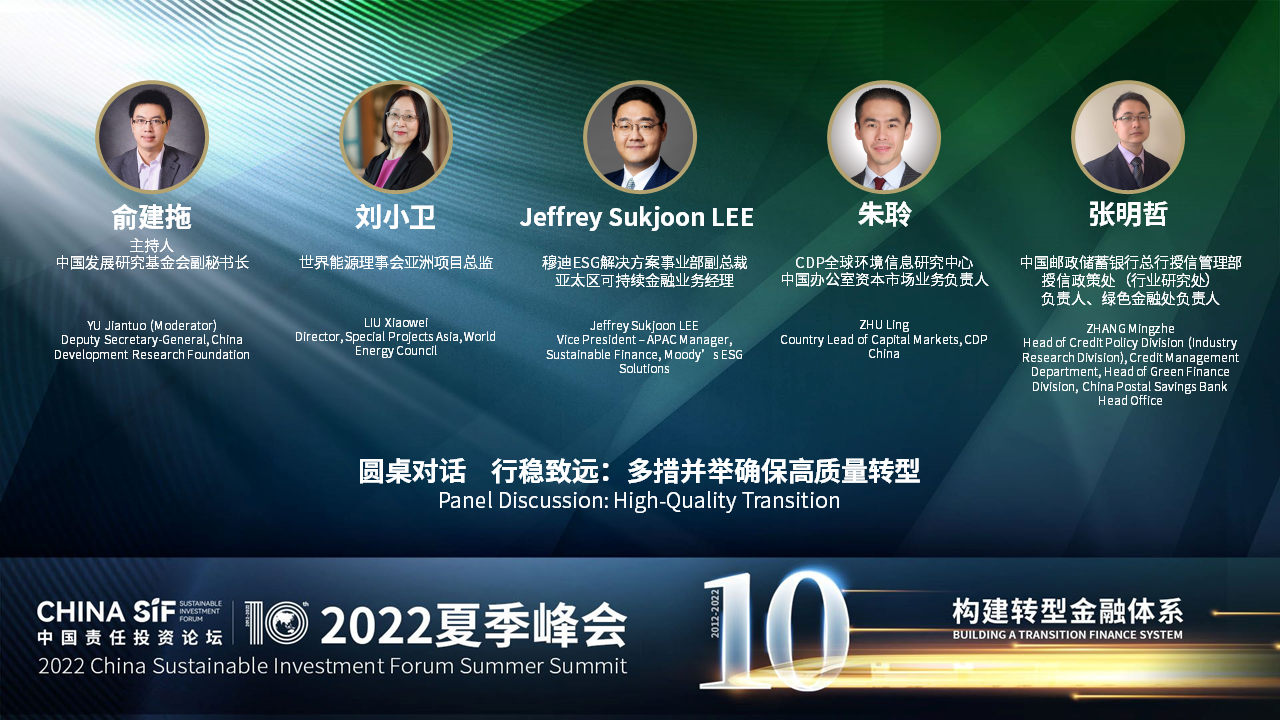
 About China SIF
About China SIF
China Sustainable Investment Forum (China SIF), established in 2012 as a non-profit organization, it was officially registered as a private non-enterprise unit in Shenzhen in 2016, with the full name of Shenzhen Jifeng Green Finance Promotion Center, is dedicated to promoting responsible investment and providing a platform for exchanging and sharing ideas on sustainable investment, with focus on facilitating Environmental, Social and Governance (ESG) integration, advocating green finance, and contributing to a responsible capital market in China. In addition, China SIF is a member of AIGCC (The Asia Investor Group on Climate Change) and Investors Agenda.
Since its establishment, China SIF has held 9 Annual Conferences, 5 Summer Summits, 5 China SIF Weeks, and a series of featured seminars and webinars, convening the key stakeholders in sustainable investment space, such as policymakers, institutional investors, financial practitioners, listed companies, service providers, experts and researchers as well as international organizations to share their lnsights and good practice.
A series of landmark research reports and sustainable investment products are launched via the platform of China SIF. China SIF also supports the ESG Investment Dissertation Competition. After years of accumulation, China Sustainable Investment Forum has become a landmark event in the field.
For enquiries on cooperation and other materials for China SIF, please contact the organiser at
contact@syntaogf.com .
Please visit the official website
https://en.chinasif.org/ for more information.
